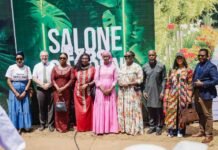By Foday Moriba Conteh
At the World Without Hunger Conference in Addis Ababa, Ethiopia, on Thursday, 7 November 2024 President Julius Maada Bio delivered an impassioned keynote address calling on global leaders, development partners and stakeholders to unite in the fight against escalating food insecurity.
Citing alarming data from the World Food Program, President Bio highlighted that 21% of Africa’s population faces moderate to severe hunger, while over 18% of Sierra Leone’s citizens grapple with severe food insecurity. His address painted a stark picture of the crisis, emphasizing the need for swift, coordinated action.
The conference, hosted by the Ethiopian Government in collaboration with UNIDO and the African Union Commission, provided a platform for President Bio to outline Sierra Leone’s initiatives to build resilient food systems. “The pursuit of a world without hunger is not just a Government responsibility but a mission that requires commitment, collaboration and support from all sectors of society,” he affirmed, underscoring the collective responsibility in tackling global hunger.
In his address, President Bio introduced Sierra Leone’s FEED SALONE program, a flagship initiative designed to boost agricultural productivity and achieve national food security. “Our program taps into Sierra Leone’s agricultural potential, youthful workforce and favorable climate, leveraging modern technology to increase productivity,” he explained. FEED SALONE’s strategies include fostering public-private partnerships, mobilizing investment to create agro-industrial clusters and promoting local food production to reduce dependence on imports. Recent progress toward rice self-sufficiency exemplifies these efforts, with investments in agricultural advancements exceeding USD 1 billion.
President Bio further emphasized the vital role of women in Sierra Leone’s agricultural sector, where they constitute over 70% of the workforce. The FEED SALONE initiative, he noted, prioritizes the economic empowerment of women while integrating value-adding processes to strengthen local production chains. “Gender equality is a cornerstone of our food security efforts,” he stated.
A critical component of Sierra Leone’s agricultural strategy is the integration of research and technology. President Bio highlighted investments in the Sierra Leone Agricultural Research Institute (SLARI), which is focused on developing climate-resilient, high-yield crops tailored to Sierra Leone’s diverse ecological conditions. Additionally, the establishment of a biometric national farmers’ registry aims to streamline resource allocation and inform evidence-based policy-making.
During his address, President Bio also announced the establishment of the Alliance of Champions for Food Systems Transformation, an initiative launching at COP28 in partnership with countries like Brazil, Norway and Rwanda. This coalition will prioritize food systems on the global political agenda, working to ensure universal access to affordable, nutritious and sustainable diets.
As Africa’s population is projected to reach 2.4 billion by 2050, President Bio emphasized the need for sustainable solutions to meet this demographic challenge. He praised Ethiopia’s wheat self-sufficiency efforts as a model of success, underscoring the impact of technological innovation, sound policies and robust leadership.
Concluding his address, President Bio called upon stakeholders across Governments, international organizations, the private sector and civil society to intensify their efforts in reimagining food systems. He stressed that achieving Sustainable Development Goal 2 (Zero Hunger) is not merely aspirational but essential for Africa’s future. “We must leverage our political capital to build a world where no child goes to bed hungry,” he urged.
Ending on a note of optimism, President Bio highlighted Africa’s abundant arable land and youthful population as key assets that could drive transformative change. “Unlocking Africa’s agricultural potential is in the world’s interest,” he affirmed, rallying leaders and stakeholders to support Africa’s journey toward food security and sustainable development.




